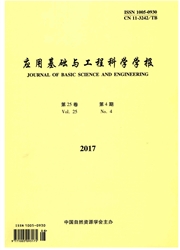

 中文摘要:
中文摘要:
惯性导航系统(INS)的导航误差随着时间积累发散,要想使其完全自主导航,必须加以其它的导航方法进行辅助,如地磁匹配辅助导航等.导航算法是地磁匹配辅助导航的关键技术之一,采用基于地磁场的最近等值线迭代算法(ICCP),实现测量值与背景场数据的最优匹配,从而获得位置信息.在吉林松花湖水面,利用高精度的铯光泵磁力仪搭载于水下机器人(ROV)进行实际水域测量,绘制出高精度的局域地磁图.基于该地磁图,通过ROV在水面上航行时的实时地磁值、航向和航速等数据,利用ICCP算法进行地磁匹配.匹配结果与GPS实测数据对比,取得理想的补偿效果.实验表明,基于ICCP的地磁匹配辅助导航能够有效修正惯导所产生的累积误差.
 英文摘要:
英文摘要:
The navigation error in Inertial Navigation System (INS) increases with accumulation of time. In order to make INS fully autonomous, it must be aided by other navigation method, such as geomagnetic-matching navigation. Navigation algorithm is one of the key technologies in the geomagnetic matching aided navigation. It can know the location information that achieve optimum matching of measured value and the background field data by the Iterative Closest Contour Point(ICCP) based on the magnetic field. The Geomagnetic field data of Songhua Lake in Jilin City was measured with high-precision Cesium Vapor Magnetometerin by Remotely Operated Underwater Vehicle(ROV) ,and a high-precision geomagnetic map was mapped out. The measured data including geomagnetic value, direction and velocity which were acquired by ROV sailing, was calculated in geomagnetic field matching by ICCP algorithm based on this high-precision geomagnetic map. Through the comparison with the data measured by GPS, a better compensation result was obtained. The experiment shows that geomagnetic-matching aided inertial navigation based on ICCP algorithm can be good at correcting the INS accumulated error.
 同期刊论文项目
同期刊论文项目
 同项目期刊论文
同项目期刊论文
 期刊信息
期刊信息
